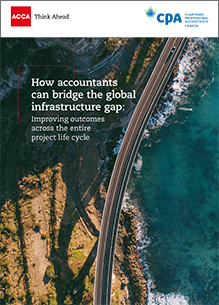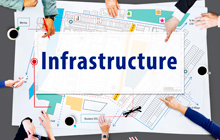Accountants are critical to infrastructure financing decisions, says ACCA, CPA Canada

Full accrual accounting used globally for infrastructure financing
TORONTO, August 19, 2019 – With the global infrastructure gap expected to reach $14 trillion (all figures in U.S. dollars) by 2040, professional accountants around the world should be given greater responsibilities as key members of infrastructure project management teams. In part one of this three-part series, "How accountants can help bridge the global infrastructure gap," we looked at the novel ways accountants can provide support to infrastructure teams, as detailed in How accountants can bridge the global infrastructure gap: Improving outcomes across the entire project life cycle, published by the Chartered Professional Accountants of Canada (CPA Canada) and the Association of Chartered Certified Accountants (ACCA).
Of course, the expertise of accounting pros is also required for traditionally recognized responsibilities, such as critical infrastructure financing decisions. Accountants are trained to provide decision makers with the best possible advice to select the most appropriate source of project financing.
Governments, by providing independent professional management for public assets, will be well placed to be able to maximize the value of their assets and also minimize the cost of liabilities, according to the report. Moreover, it noted that “allocating more decision-making authority to independent, professional accountants will be an important step in the effective commercial management of public assets.”
 |
Download How accountants can bridge the global infrastructure gap: Improving outcomes across the entire project life cycle. |
CPA Canada and ACCA explain that, in response to the challenge of the growing global infrastructure gap, “governments are adopting novel means of effectively funding and financing their public infrastructure — as well as turning to institutional investors, foreign direct investment and the private sector.” The two accounting bodies, which based their report on a survey of 3,611 accountant respondents globally, stress how accounting professionals act as a critical interface between participants by, for example, effectively communicating and negotiating the terms of an infrastructure finance deal.
The report also says accountants “can play an important role by helping to identify the most efficient funding models, while also taking a leading role on the negotiation with potential private sector investors and representing the public interest through their high ethical standards.”
It states further that “the financial viability of the project needs to be balanced against affordability for users and access to public goods and services. Accountants must consider how they can develop and communicate the private sector incentive for investing in priority projects, while also supporting the public interest and providing taxpayers with value for money.”
The report identifies the appropriate transfer of risk from the public to the private sector in the building and running of the infrastructure; and efficiencies achieved through the use of private sector money in the financing, building and operation of public infrastructure, as two key benefits that can justify the use of private finance for public infrastructure. It recommends that accounting professionals on the infrastructure team take the following measures:
• Advocate a more holistic approach to maintaining fiscal discipline to avoid poor financial decisions driven by "fiscal illusions."
• Conduct a balance sheet review to maximise the value of public sector assets.
• Produce an intertemporal balance sheet to improve long-term decision making and support the sustainability of public finances; and
• Produce disaggregated assets in the balance sheet, to include commercial, social and financial assets — in order to improve the return on public assets.
The role of full accrual accounting
In terms of financial presentation, whereas the public sector has traditionally used the cash basis or modified cash basis, internationally, accounting bodies have adopted full accrual accounting to support decision making on infrastructure. Full accrual accounting allows for more transparency with respect to the assets that are being engaged for infrastructure projects, explains Davinder Valeri, the Toronto-based director of strategy risk and performance for CPA Canada, and the report’s co-author, in an interview.
For example, with respect to non-financial assets such as the purchase of a building or a ship, “with full accrual accounting, you can write that off over the life of the asset, as opposed to expensing it in just the one year you acquired it. The benefits of full accrual accounting allow governments to recognize the full value of their assets and their liabilities and to showcase their position to their constituents,” she elaborates.
A good example of the application of an intertemporal balance sheet is the effort being made by the New Zealand government to incorporate long-term sustainability information in its national reporting.
“New Zealand is a very progressive country. In their 2018 Investment Statement, they have listed human capital, natural capital, and financial capital, and it shows their investment position as a government, which is a bit more inclusive and broader. This is offering more information than a traditional financial statement would have,” explains Valeri.
“The accountants are producing this analysis to provide decision makers with a better long-term view of their policy decisions that can help improve the sustainability of public finances. Basically you manage what you measure,” she adds.
In part three of this series, we'll look at the recommendations in the report for how the accounting profession can bridge the global infrastructure gap through the skills and expertise of Canadian accountants and accountants around the world.
This is the second of a three-part series on the accounting profession and the infrastructure gap by Jeff Buckstein, CPA, CGA.








(0) Comments